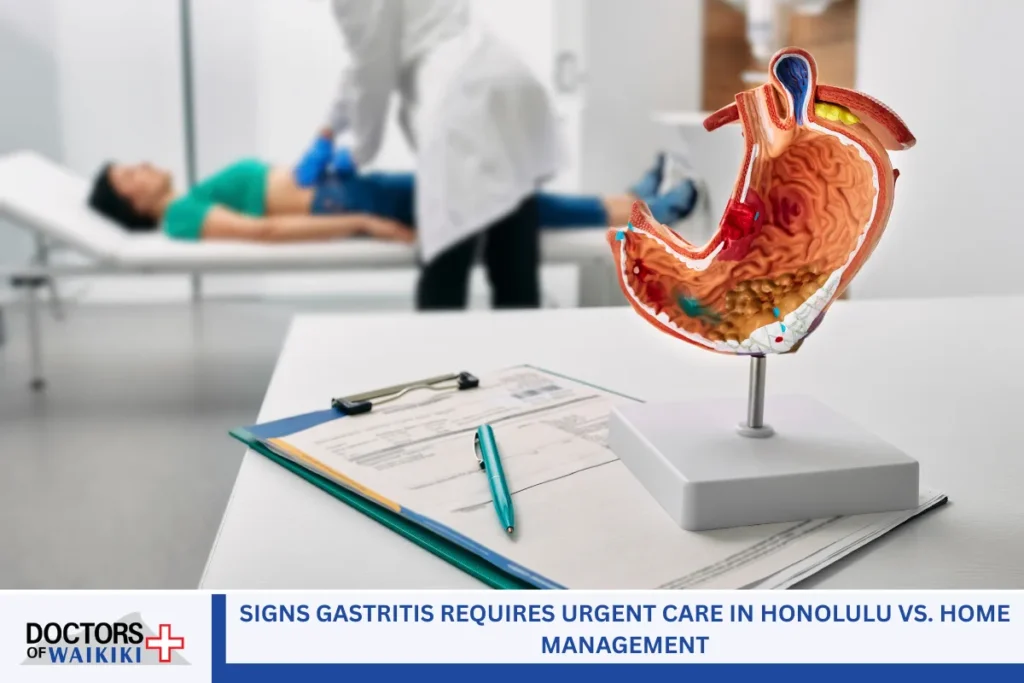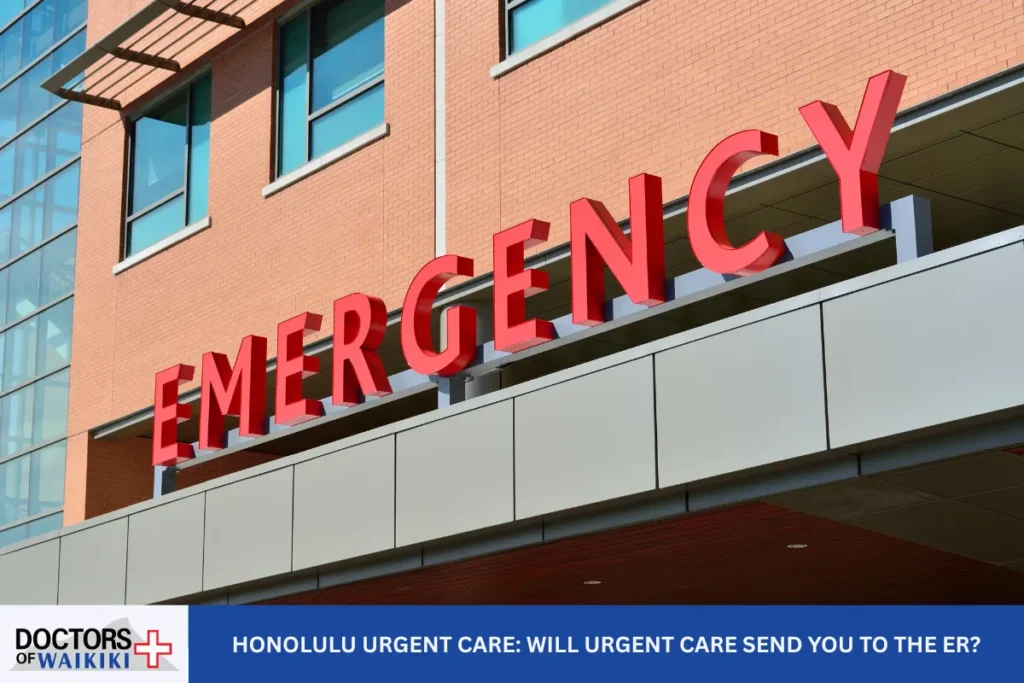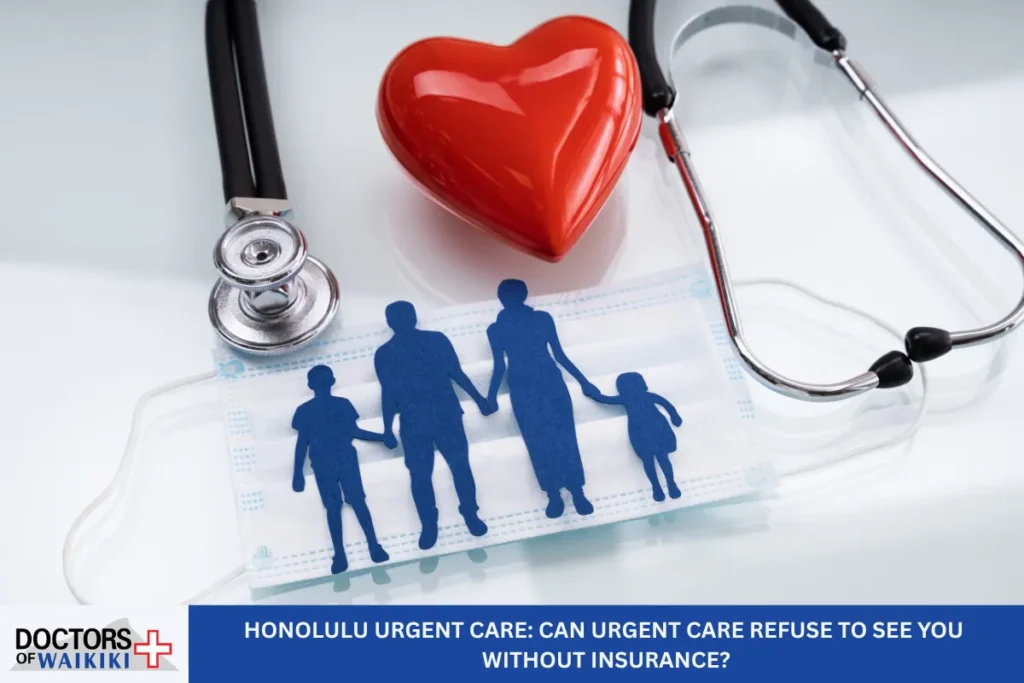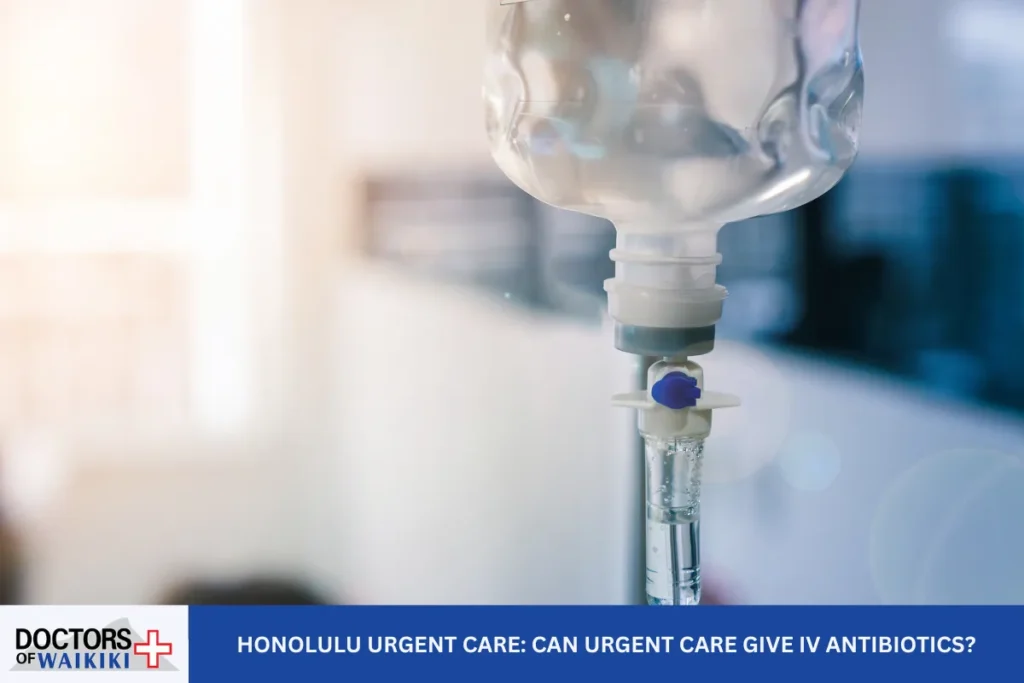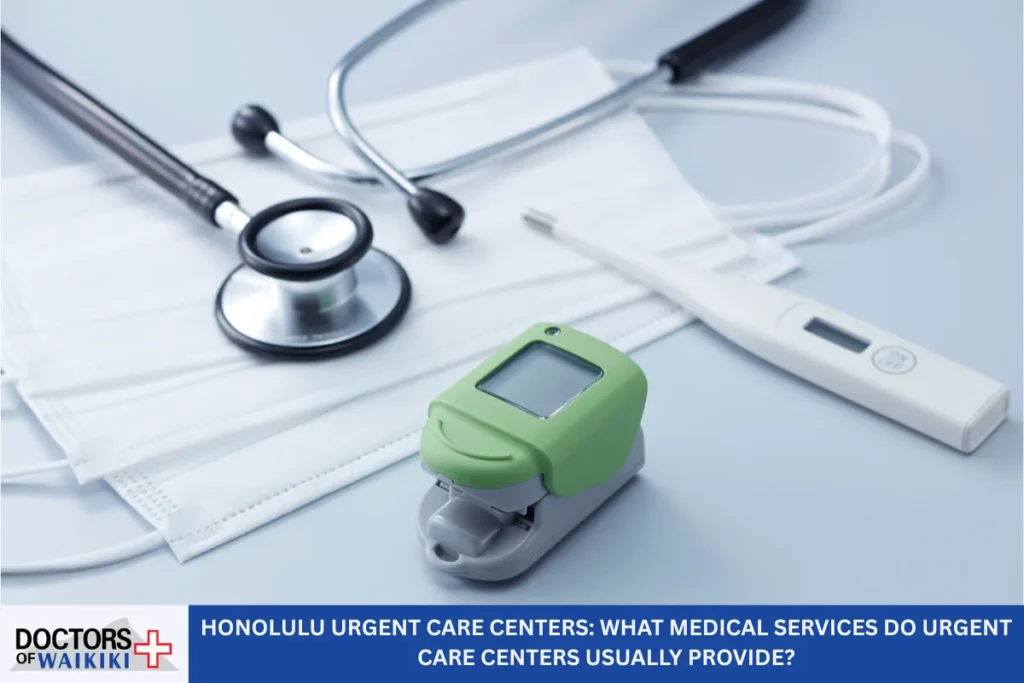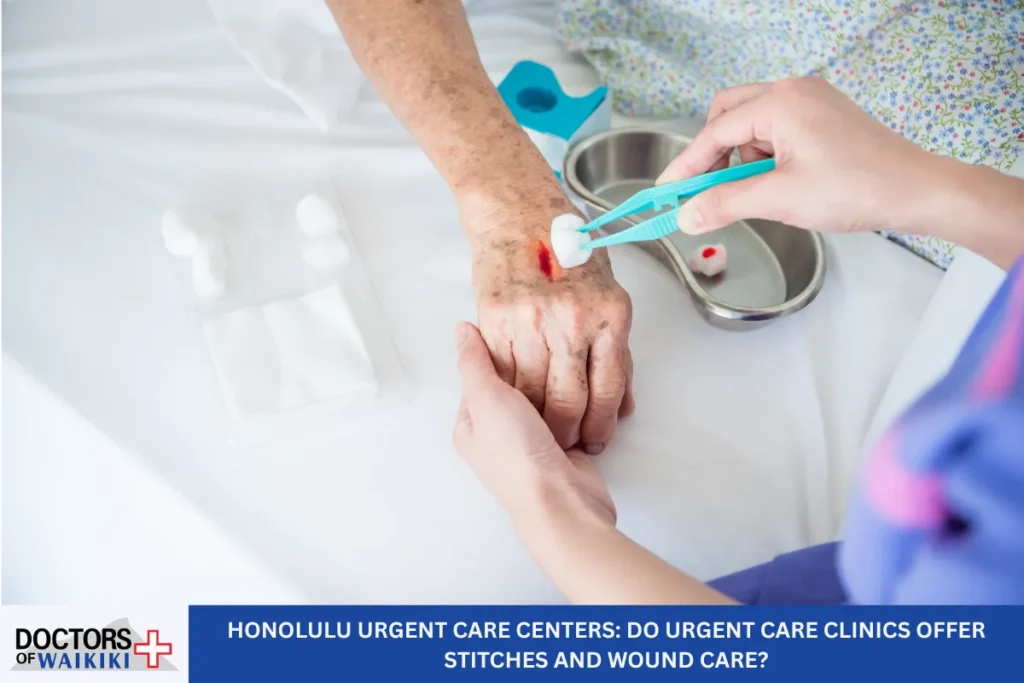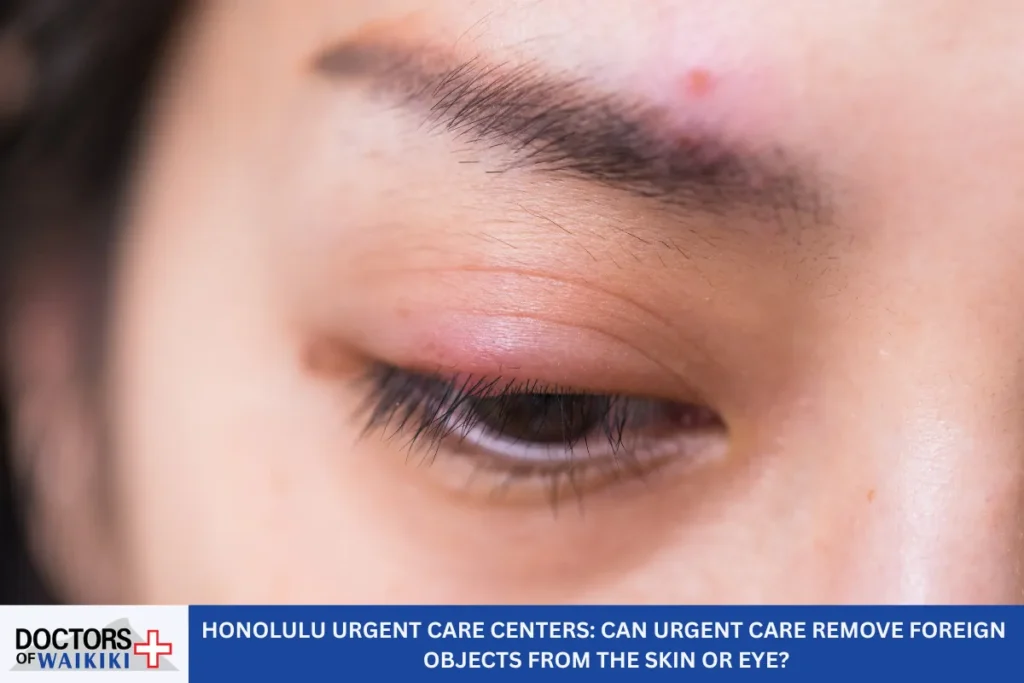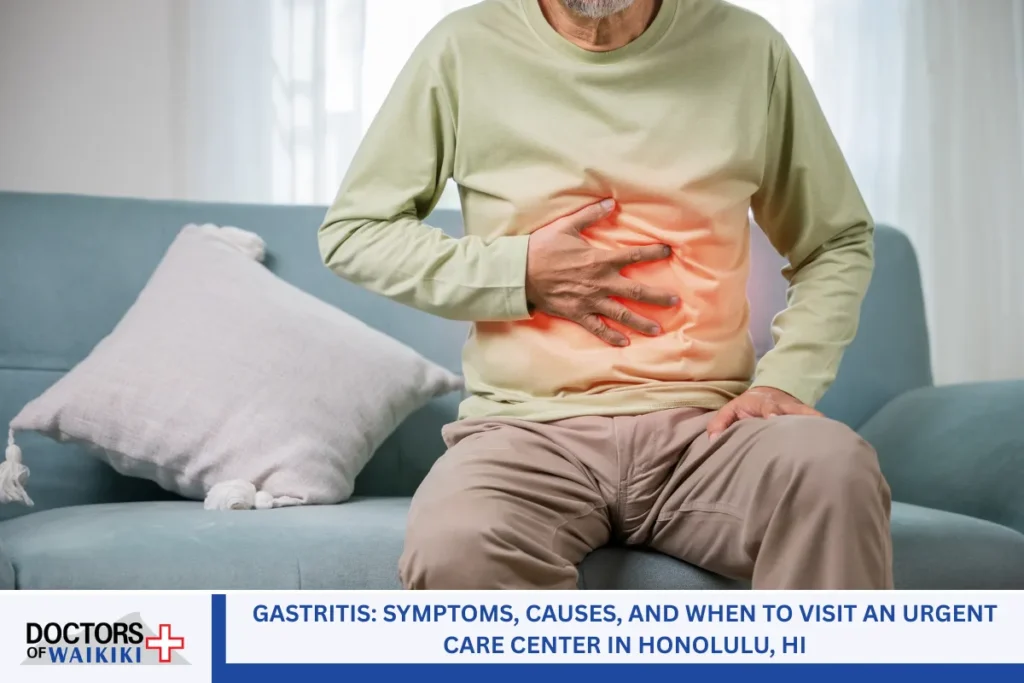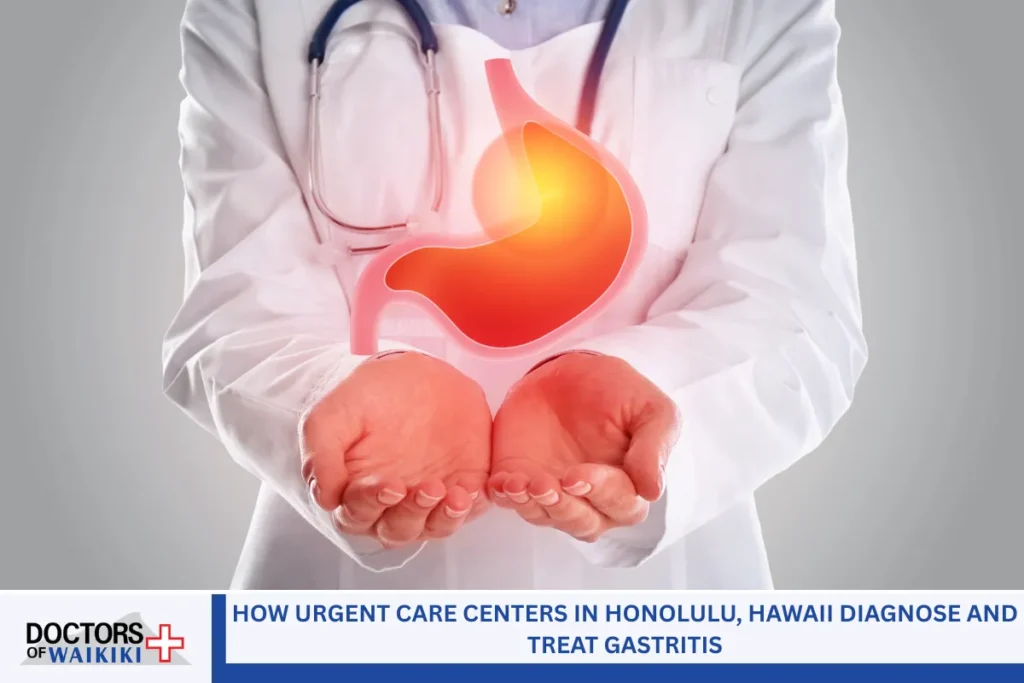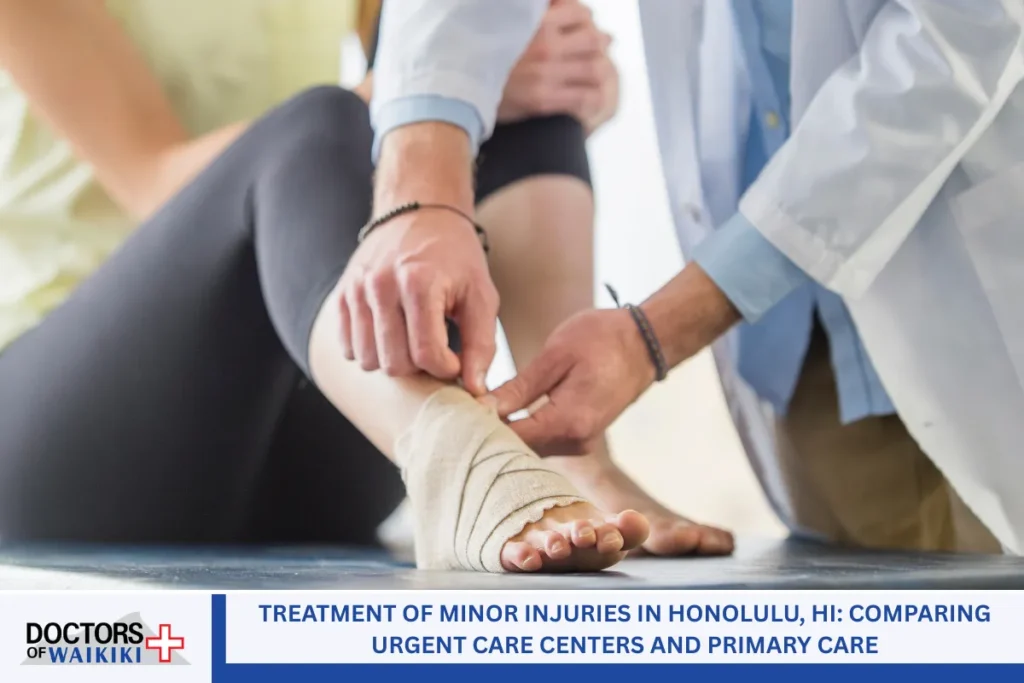Is Your Gastritis an Emergency? Urgent Care Center Solutions in Honolulu
If you’re suffering from stomach pain and suspect acute gastritis, knowing whether to visit an urgent care center in Honolulu or manage your symptoms at home can make a huge difference in your health. For many, it’s hard to tell if your discomfort is a minor issue or a sign of something more serious requiring urgent care services. Ignoring warning signs can turn a simple health issue into a dangerous emergency. Fortunately, with the right information, you can make the best decision for your situation—protecting yourself from unnecessary trips to the emergency room and ensuring you get the best urgent medical care, fast. This article breaks down the signs that indicate when a walk-in clinic or urgent care clinic is the best option, how healthcare providers and staff in Honolulu approach gastritis, and what you can expect from your visit—including treatment options, payment details, and follow-up care.
Understanding Gastritis: What Is It and Why Does It Matter?
What Is Gastritis?
Gastritis is inflammation of the stomach lining. This condition can be acute (sudden and severe) or chronic (persistent, long-term), with causes ranging from infections like Helicobacter pylori, certain medications (NSAIDs), excessive alcohol use, autoimmune response, and even stress. Some patients develop gastritis due to underlying medical conditions, such as autoimmune atrophic gastritis or autoimmune metaplastic atrophic gastritis. Recognizing whether your symptoms are related to a temporary upset or a chronic condition is crucial for choosing the right healthcare setting.
Common Symptoms of Gastritis
Typical symptoms of gastritis include:
- Abdominal pain or discomfort
- Nausea or vomiting
- Bloating and feeling of fullness
- Loss of appetite
- Black, tarry stools (possible bleeding)
- Indigestion or burning sensation
But how do you know when these symptoms require urgent care clinic attention or are manageable at home?
When to Head to an Urgent Care Center in Honolulu
Warning Signs That Need Immediate Attention
Some gastritis symptoms can point to a more serious problem—like bleeding, peptic ulcer disease, or even a perforation in the stomach lining. You should seek urgent care services or visit a walk-in clinic if you notice:
- Severe or persistent abdominal pain that doesn’t go away
- Vomiting blood (red or black, like coffee grounds)
- Black, tarry stools
- Sudden drop in blood pressure (fainting, confusion, dizziness)
- High fever or chills
- Difficulty breathing
- Severe dehydration (dry mouth, reduced urination, weakness)
- Unexplained weight loss
Urgent care options, including an urgent care center or walk-in clinic, can provide immediate medical consultation and diagnostic tests. In some cases, your provider may refer you to the emergency room for advanced care if your symptoms suggest a life-threatening issue.
Why Choose Urgent Care Clinic Over the Emergency Room?
Most cases of nonemergency gastritis can be safely and quickly managed at an urgent care clinic rather than the emergency department. Walk-in care centers offer:
- Shorter wait times
- Access to diagnostic equipment like laboratory tests, CT scan, and digital x-ray
- Experienced medical professionals (board-certified doctors, nurse practitioner, advanced-practice providers)
- Medication counseling and pharmacy services
- Lower out-of-pocket costs for insured and self-pay patients
- Convenient hours of operation
Urgent care services are ideal for minor to moderate medical issues that need prompt attention but are not true emergencies.
Home Management of Mild Gastritis: What You Can Do
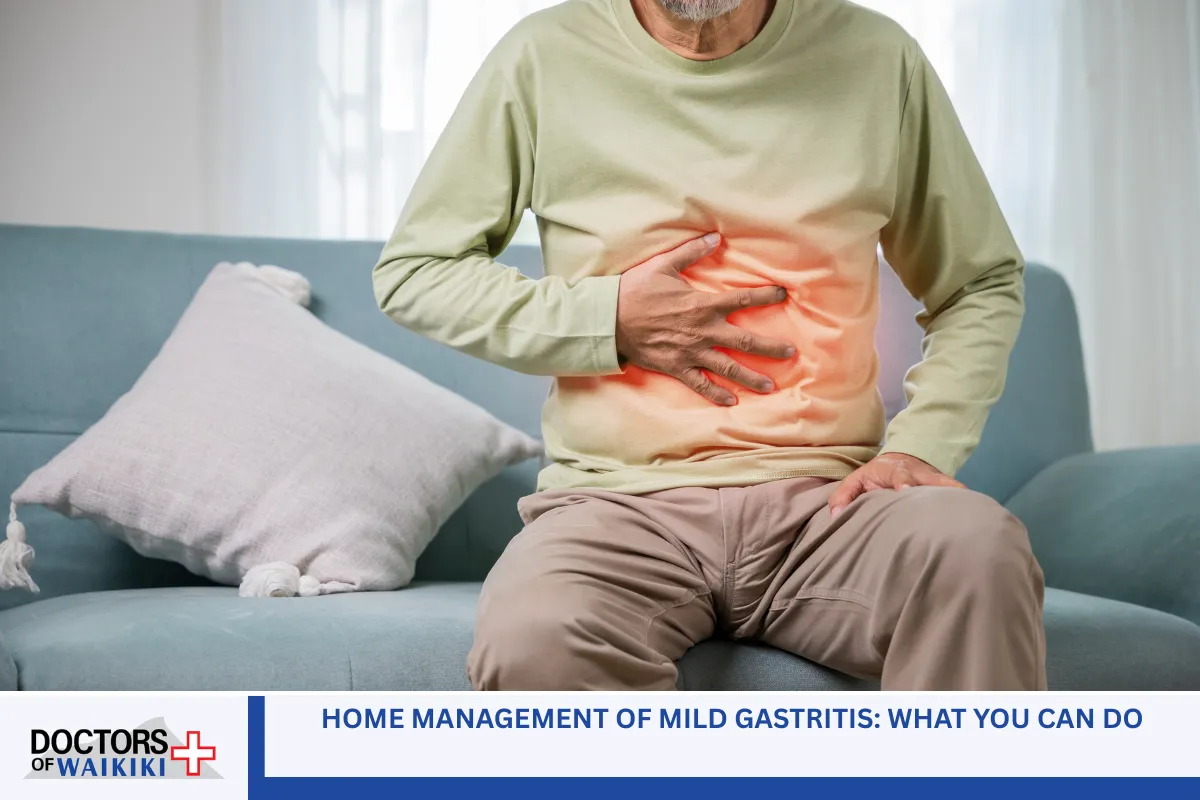
When It’s Safe to Treat Gastritis at Home
If your symptoms are mild, with no signs of bleeding or severe distress, you may be able to manage your condition at home. In-home treatment focuses on symptom management and preventing further irritation of the stomach lining. Try the following steps:
- Adopt an Anti-Inflammatory Diet:
Choose foods that support gut health and avoid those that can worsen inflammation—skip processed foods, white bread, and fried items. Focus on whole grains, lean proteins, and fresh fruits and vegetables. - Stay Hydrated:
Drink plenty of water to help soothe your stomach and prevent dehydration. - Over-the-Counter Medications:
Use antacids or proton pump inhibitors as recommended by a primary care provider to reduce stomach acid and allow healing. - Rest and Stress Management:
Practice relaxation techniques such as deep breathing, meditation, or gentle exercise to reduce stress—a known trigger for some cases of gastritis. - Monitor Symptoms:
Keep a detailed record of your medical history information, noting any changes in symptoms or new developments.
Always reach out to your healthcare providers and staff if symptoms worsen or fail to improve with these measures.
Diagnostic Tools and Treatment Options at a Honolulu Walk-In Clinic
What to Expect During Your Visit
When you walk in for urgent medical care at a medical facility or urgent care clinic in Honolulu, the process typically includes:
- Initial Evaluation by Medical Assistants or Medical Professionals:
You’ll be asked about your symptoms, medical history, current medications, and risk factors. - Physical Examination and Vital Signs Check:
Nurse practitioners or advanced practice providers will check for abdominal tenderness, blood pressure, and signs of dehydration. - Diagnostic Testing:
The medical team may order lab tests such as a stool test (to check for blood or infection), blood work, or even a CT scan or MRI scans for more serious presentations. In some cases, an upper GI endoscopy may be scheduled to visualize the stomach lining. - Treatment Plan:
Based on your results, your provider will create a personalized treatment plan, which may include prescription medications (such as proton pump inhibitors), dietary recommendations, or referral to internal medicine or a gut health dietitian.
Common Treatments Offered at Urgent Care Centers
- Medications to decrease stomach acid
- Antibiotics for infections like Helicobacter pylori
- IV fluids for dehydration
- Pain management and symptom relief
- Medication counseling on how to use your prescriptions properly
- Follow-up appointments or referrals for further care
Special Considerations for Patients With Chronic or Autoimmune Gastritis
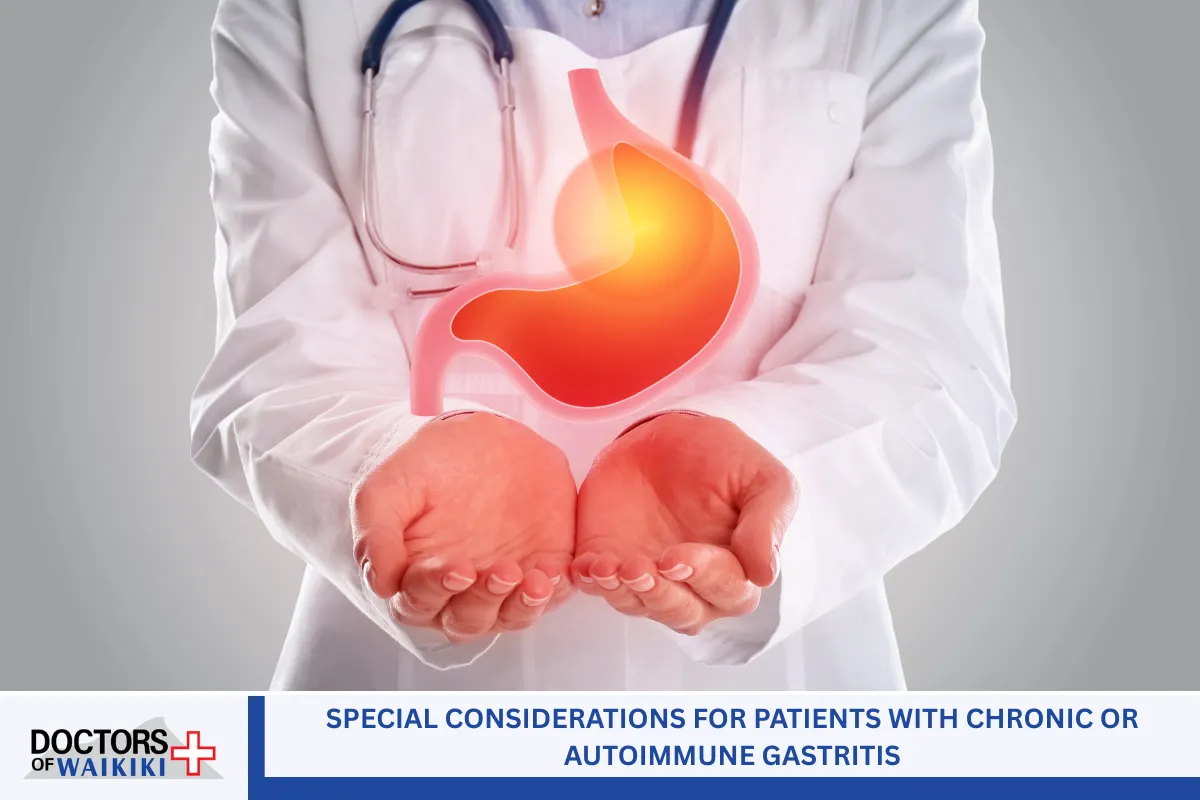
Chronic Gastritis: Why Ongoing Care Matters
For patients with atrophic gastritis or autoimmune atrophic gastritis, ongoing management is critical. Chronic inflammation can lead to complications such as gastric polyps, vitamin B12 deficiency, and even an increased risk of stomach cancer. Your primary care physician may coordinate with an urgent care clinic to schedule regular follow-up visits, laboratory tests, and even imaging tests to monitor your condition.
Autoimmune and Allergic Causes
Some individuals experience allergic reactions or immune responses that affect the stomach lining. If your gastritis is connected to seasonal allergies, hay fever, or an immune system disorder, your medical provider may recommend allergy testing or symptom management for runny nose, watery eyes, and nasal congestion. Healthcare professionals at Honolulu walk-in clinics are equipped to handle both digestive and allergy-related medical issues.
Insurance, Payment, and Records: What Patients Should Know
Navigating Health Care Coverage
Urgent care centers in Honolulu accept most major insurance plans, and some offer self-pay discounts or payment in full at the time of service. Before your appointment, confirm your coverage, and bring your insurance card, photo ID, and any relevant medical records.
- Ask about coverage for diagnostic tests, laboratory work, and prescription medications.
- If you are uninsured, ask about payment options or discounts.
Privacy and Medical Records
All urgent care clinics follow federal and state privacy regulations to protect your health information. After your visit, you may request copies of your patient care records, lab and test results, and treatment plan. These can be shared with your primary care provider for continuity of care.
Advanced Services: More Than Just Basic Urgent Care
Expanded Offerings at Modern Walk-In Clinics
Today’s urgent care centers provide much more than basic medical care. Many offer:
- Digital x-ray and advanced diagnostic equipment
- Physical therapy, occupational health, and workers comp injury treatment
- Pharmacy and medication counseling
- Immunizations, COVID-19 services, and vaccination records
- Travel and immigration physicals (including TB blood test, syphilis, gonorrhea)
- Wellness services and biometric testing
- Orthopedic urgent care for bone and joint issues, including setting and casting broken bones
- Platelet-rich plasma and growth factors for sports injuries
- Internal medicine consultations
Some even partner with a legal representative to assist patients with medical history information for legal or workers comp needs.
How to Choose the Best Urgent Care Center in Honolulu
Factors to Consider When Selecting a Clinic
When searching for the best urgent care or walk-in clinic in Honolulu, consider:
- Location and Hours of Operation:
Choose a medical facility close to your home or workplace, with convenient walk-in care hours—including evenings and weekends. - Medical Providers and Staff:
Look for board-certified doctors, experienced nurse practitioners, and medical assistants committed to compassionate customer service. - Comprehensive Services:
Select a center that offers everything from laboratory testing to allergy relief and orthopedic urgent care. - Reputation:
Read reviews, ask family and friends for recommendations, and check for affiliations with local health care networks. - Insurance and Payment:
Confirm accepted insurance plans and payment policies in advance.
Proactive Steps: Preventing Gastritis Flare-Ups at Home
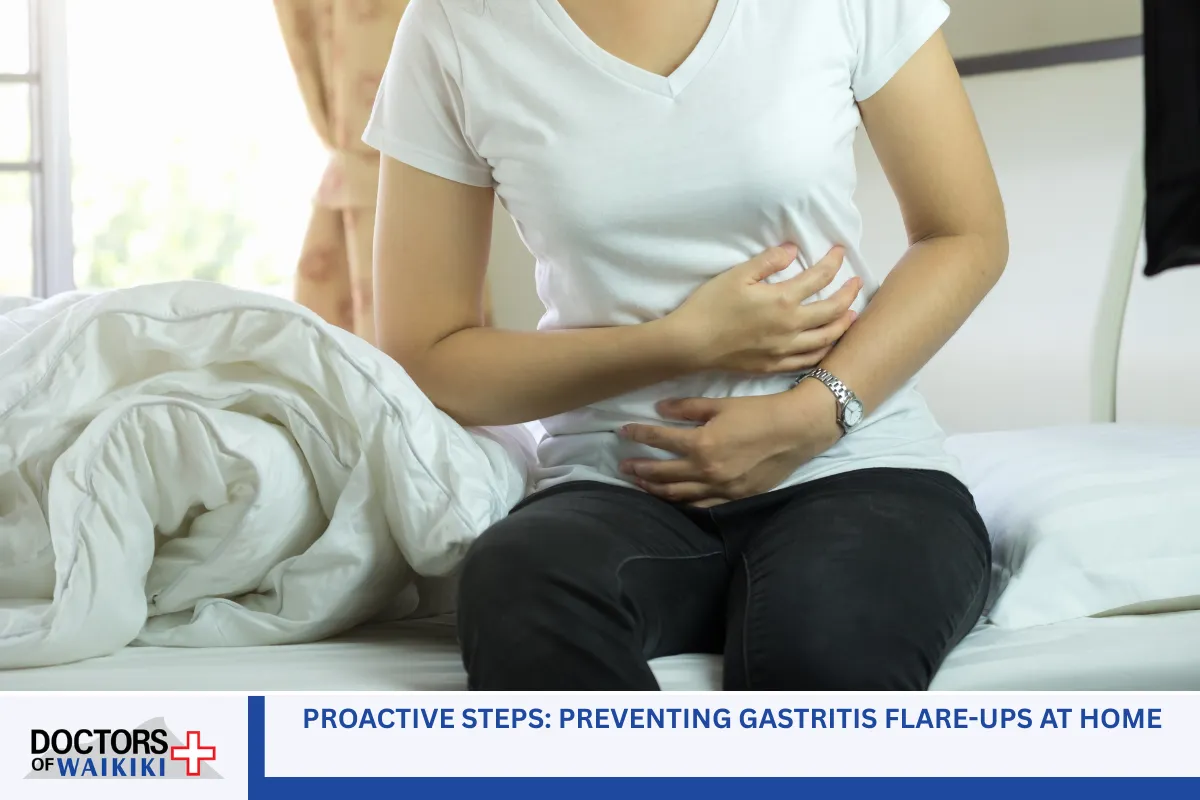
Lifestyle Changes to Protect Your Stomach
Reducing your risk for acute gastritis or chronic condition flare-ups begins with everyday choices. The following practical lifestyle changes can help keep your stomach lining healthy and minimize the need for urgent medical care:
- Follow an Anti-Inflammatory Diet:
Limit foods that irritate the stomach, such as spicy dishes, white bread, processed foods, and high-fat meals. Choose foods rich in antioxidants and fiber for gut health. Some patients benefit from digestive enzyme supplements, particularly those recommended by a gut health dietitian. - Moderate Alcohol and Avoid Smoking:
Both alcohol and smoking can damage your stomach lining and increase your risk for gastritis and peptic ulcer disease. - Manage Stress:
Stress management techniques, such as mindfulness, yoga, and adequate sleep, can lower your risk of symptom flare-ups. - Review Medications With Your Provider:
Talk to your primary care physician about safe pain relief options if you need long-term medication, as some drugs (especially NSAIDs) can cause or worsen gastritis. - Address Allergies Promptly:
For patients with allergy symptoms and treatments—such as runny nose, watery eyes, or nasal congestion—proper allergy testing and treatment can reduce immune system overactivity that affects the stomach.
When to Schedule Follow-Ups
Even after your urgent care clinic visit or home management, it’s important to schedule follow-ups if:
- You notice ongoing or new symptoms
- There is a change in your health care or medication needs
- Your provider recommends repeat laboratory or imaging tests
- You are managing an underlying chronic or autoimmune condition
Early intervention and regular monitoring are key to preventing complications, such as peptic ulcer or vitamin B12 deficiency.
Honolulu’s Urgent Care Centers: Fast, Convenient, Comprehensive
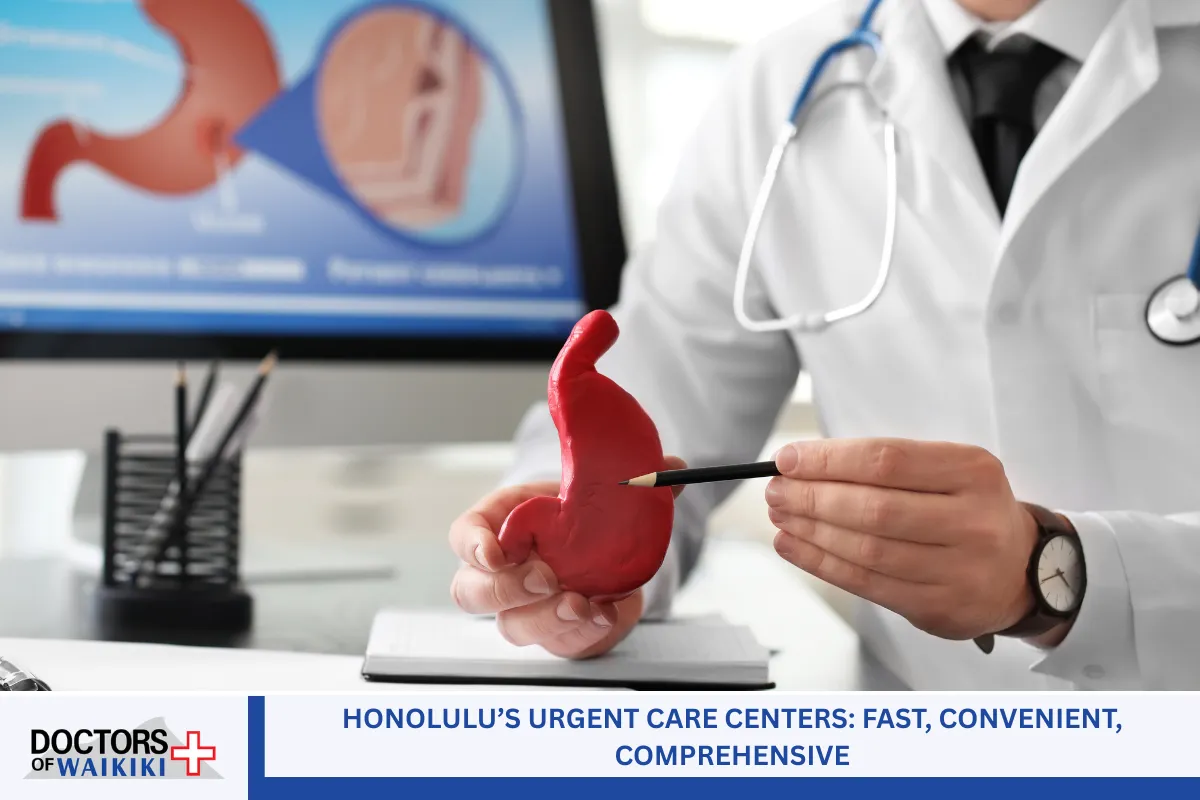
Walk-In Care for the Whole Family
The best urgent care centers in Honolulu are designed for patient convenience, safety, and comprehensive healthcare. Whether you need walk-in care for a minor injury, allergy relief, or sudden stomach pain, these clinics offer a wide range of urgent care services for individuals and families—including:
- COVID-19 testing and immunizations
- School and sports physicals
- Vaccination records and travel medicine
- Occupational health and workers comp injury treatment
- Advanced digital x-ray and laboratory diagnostics
- Orthopedic urgent care for broken bones and joint injuries
- Wellness services, biometric testing, and medication counseling
- Payment in full or insurance-based options for easy billing
- Bilingual healthcare providers and staff, ready to assist in English and Spanish
Most clinics operate on a walk-in basis, but you can also schedule appointments online for added convenience, especially during inclement weather or high-demand times.
Questions to Ask During Your Urgent Care Visit
Making the Most of Your Medical Consultation
To ensure you receive the best medical care and clear answers, consider asking these questions at your urgent care center:
- What tests will I need for my symptoms?
- Are my symptoms likely due to acute gastritis, infection, or another cause?
- What treatment plan do you recommend?
- Should I follow up with my primary care provider?
- What warning signs should I watch for at home?
- Are there any diet and lifestyle changes I should make?
- How can I obtain my patient care records or lab and test results?
- What are the payment options if I don’t have insurance?
- How can I contact the clinic if my symptoms get worse?
By partnering with healthcare professionals and keeping track of your own health care needs, you help ensure better outcomes for yourself and your family.
When Gastritis Becomes a Medical Emergency
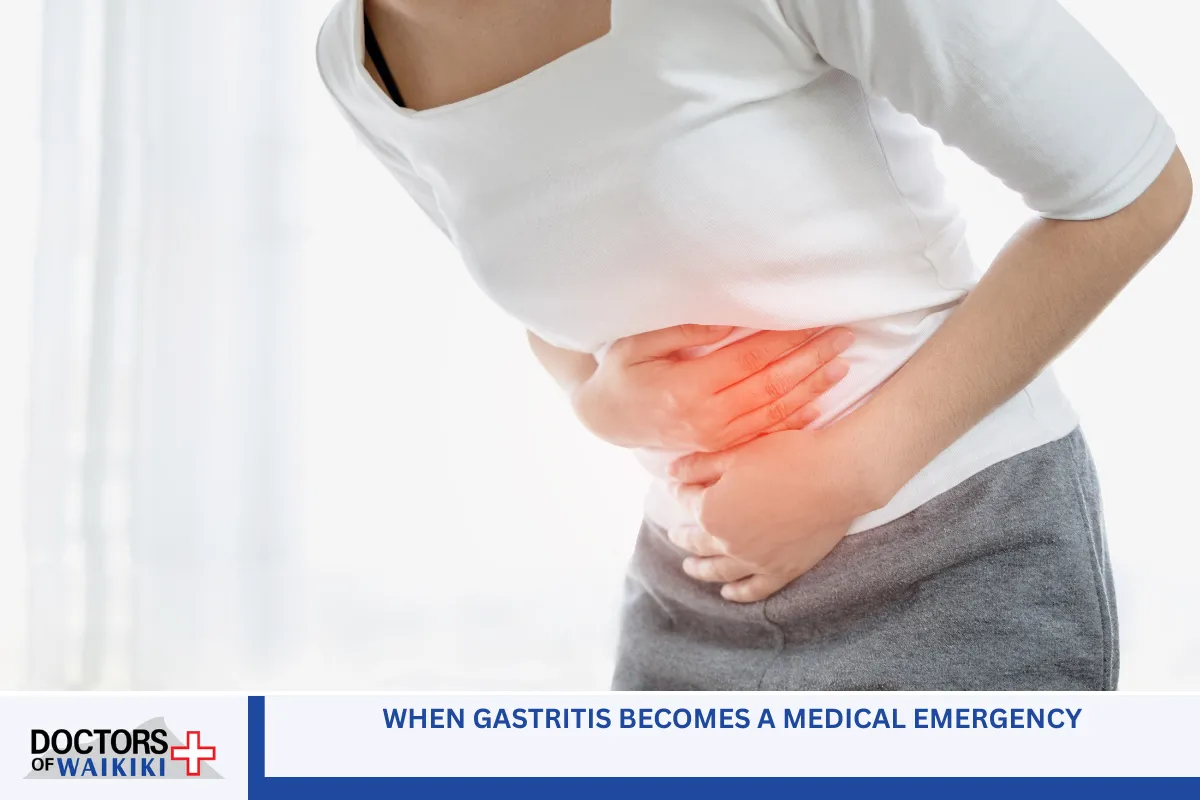
Recognizing Life-Threatening Symptoms
While urgent care clinics are equipped for most nonemergency conditions, some symptoms demand a visit to the emergency department right away. Call 911 or visit the nearest emergency room if you experience:
- Severe chest pain with sweating or shortness of breath
- Severe abdominal pain with rigid, tender belly
- Vomiting large amounts of blood
- Signs of shock (rapid heartbeat, fainting, cold clammy skin)
- Unresponsive or unconscious state
Emergency medicine physicians are trained to handle these severe scenarios, and immediate care can be life-saving.
Taking Control of Your Digestive Health in Honolulu
Your Health, Your Choices
Gastritis can range from a mild annoyance to a dangerous health crisis. Knowing when to choose urgent care services, walk-in clinic options, or home management can protect your health and provide peace of mind. Honolulu residents benefit from accessible urgent care centers and medical facilities staffed by compassionate medical professionals, medical assistants, and advanced practice providers who prioritize quick, effective, and affordable care.
The next time you or your family experiences symptoms such as abdominal pain, persistent indigestion, or unexplained nausea, don’t wait and worry. Visit a trusted urgent care clinic for a thorough medical examination and treatment plan—helping you return to normal life quickly and safely.
Urgent Care Center in Honolulu, Hawaii — Doctors of Waikiki
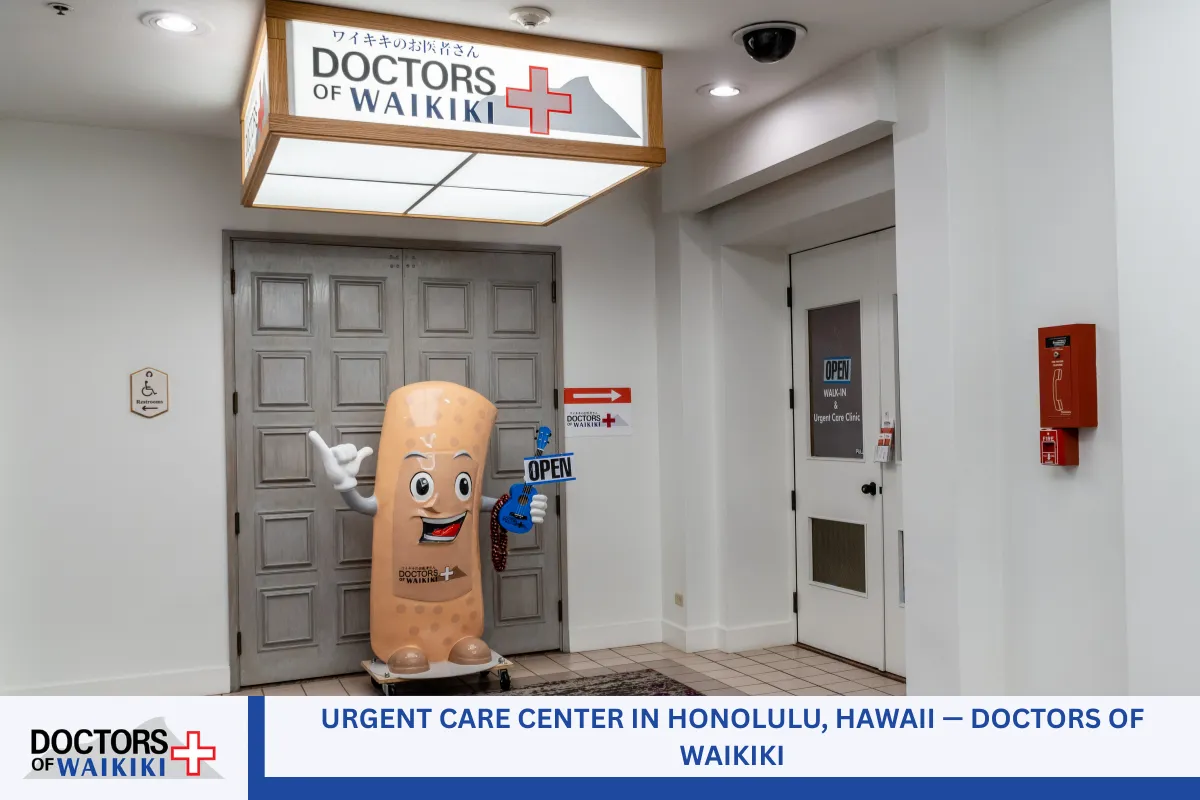
If you need prompt, compassionate care for stomach pain, acute gastritis, or other health concerns, Doctors of Waikiki is your trusted urgent care center in Honolulu, Hawaii. Our walk-in clinic provides comprehensive medical services, from diagnostic tests to effective treatment plans, ensuring you get the help you need—fast. Whether you’re dealing with abdominal pain, bile reflux, or seasonal allergies, our experienced medical clinic team delivers outstanding care without the long wait of emergency room services. We proudly serve Honolulu and surrounding areas, offering a full range of urgent care services seven days a week. Call (808) 922-2112 or fill out our easy online contact form to schedule your visit. Choose Doctors of Waikiki for exceptional healthcare, every day.
Frequently Asked Questions
1. When should I visit an urgent care center instead of the emergency room for gastritis?
If you have mild to moderate symptoms such as stomach pain, indigestion, or mild nausea, visiting an urgent care center is typically appropriate. Our walk-in clinic can provide diagnostic tests and immediate treatment plans for gastritis and related medical issues like bile reflux or minor infections. However, if you are experiencing severe symptoms—such as vomiting blood, black stools, or severe abdominal pain—you should go directly to emergency room services. These symptoms could indicate a more serious disease process such as a bleeding peptic ulcer or stomach lining growths, which require advanced care.
2. What kinds of medical services for gastritis does Doctors of Waikiki offer?
Doctors of Waikiki provides a wide range of medical services to diagnose and treat gastritis. Our medical clinic is equipped to perform laboratory and diagnostic tests, offer medications for symptom relief, and create individualized treatment plans. We also educate patients about dietary changes, including the role of beneficial bacteria like L. reuteri for digestive health. If advanced imaging or specialist referral is needed, we coordinate with other local healthcare providers to ensure continuity of care. Our team is also skilled in managing related concerns such as bile reflux, food intolerances, and underlying chronic medical issues.
3. How do I know if my symptoms are from gastritis or another digestive disease process?
Gastritis commonly presents with abdominal pain, nausea, and bloating, but these symptoms can overlap with other conditions such as peptic ulcer disease, bile reflux, or even stomach lining growths. At Doctors of Waikiki, our experienced providers will conduct a thorough medical examination, review your medical history, and may recommend tests such as blood work or stool analysis to confirm the diagnosis. By ruling out other possible disease processes, our medical professionals can quickly direct you to the best treatment plan or, if necessary, refer you for emergency room services for further evaluation.
4. Can lifestyle changes really help manage or prevent gastritis?
Absolutely. Many cases of gastritis can be managed or even prevented with diet and lifestyle changes. Avoiding processed foods, white bread, and excessive alcohol, while adding foods that promote gut health (including those containing L. reuteri), can protect the stomach lining and reduce inflammation. Managing stress, not smoking, and seeking early treatment for allergy symptoms can also lower your risk of flare-ups. Our medical team at Doctors of Waikiki offers counseling and support for making these important changes, ensuring long-term wellness for you and your family.
5. How quickly can I get care at Doctors of Waikiki, and do I need an appointment?
Doctors of Waikiki is proud to offer convenient walk-in clinic hours and fast service for urgent care needs. No appointment is necessary—simply walk in for medical care, whether it’s for a minor to moderate medical issue or ongoing symptom management. Our medical assistants and healthcare professionals will see you promptly, and most visits are completed within an hour. For added convenience, you can fill out our contact form online or call us at (808) 922-2112 to schedule a time that works for you. We accept most insurance plans and offer transparent payment options to make urgent medical care accessible for all patients.
Read How Urgent Care Centers in Honolulu, Hawaii Diagnose and Treat Gastritis

